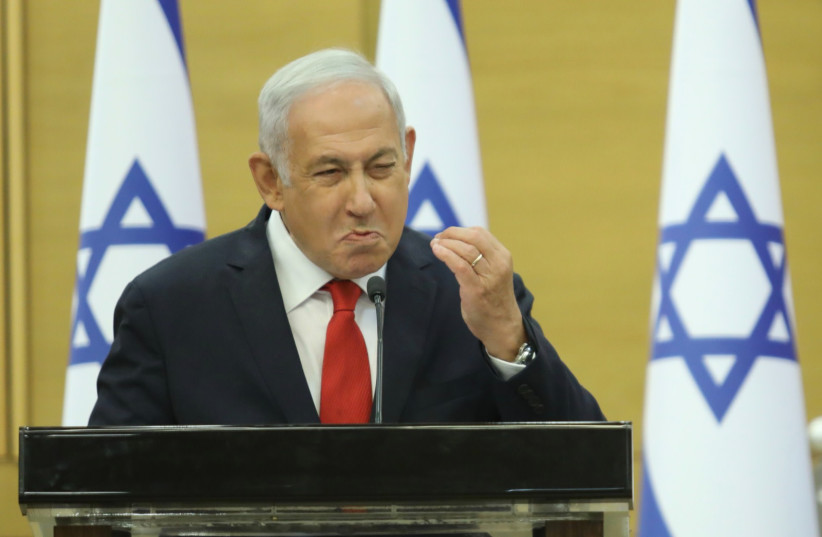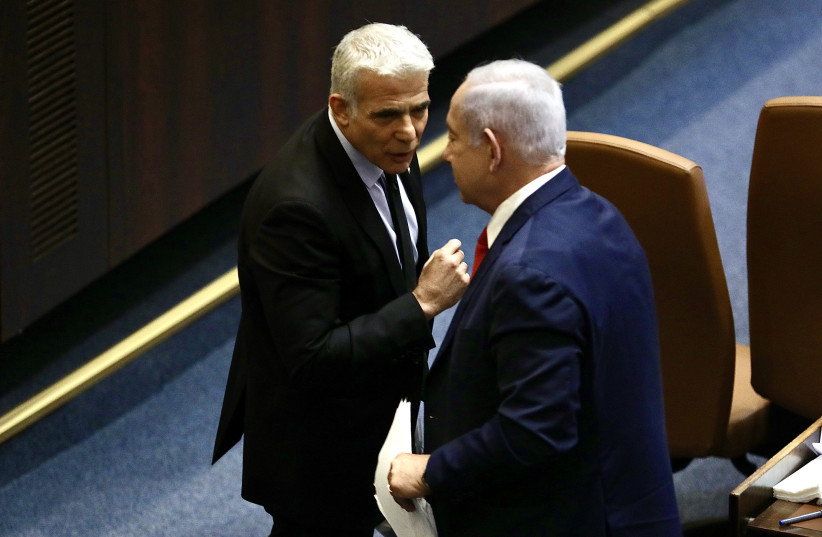Israel’s new government has been in power for six months and it is hitting its stride in diplomatic achievements. President Isaac Herzog met British Prime Minister Boris Johnson this week while Defense Minister Benny Gantz traveled to Morocco where a historic Memorandum of Understanding was signed.
The symbolic and productive foreign visits are part of a wider-ranging revolution in Israeli diplomacy.
Today, the toxic relationship that once dominated former prime minister Benjamin Netanyahu’s relationship with the foreign ministry, appears to be gone. Instead of ministers being stymied on their foreign trips, lest they take away the spotlight from the Prime Minister, the current government appears to function well, enabling the Defense Minister, Foreign Minister Yair Lapid and others to have their own successes.
This functioning government holds up a mirror to the decade of disfunction that Israelis became used to. Because Netanyahu dominated politics for such a long time, and because he came in the wake of the dark years of the Second Intifada when Israel’s Ariel Sharon was seen as controversial in many western capitals, Israelis got used to the idea that Israel’s place among the nations was primarily in meetings with the US, or with countries like India, China, or more right-leaning governments, like the leader of Hungary. Israel was castigated for being part of the emerging authoritarian world order, and Israel appeared happy to oblige.

Today things are different.
Gone is the chaos, attempts to undermine the Foreign Ministry have stopped, the Prime Minister is no longer holding up 35 diplomatic appointments, there is an actual budget now and the chaos of endless elections has been reduced.
Watching Gantz arrive in Morocco was striking. He visited the Mausoleum of King Mohammed V and laid a wreath. He was received with honor and pomp and circumstance. He met the Inspector General of Morocco’s Armed Forces and had lunch with the Minister Delegate of National Defense, Minister of Foreign Affairs and officials in the defense establishment. He also saw an airborne brigade and met the foreign minister, as well as going to a synagogue, according to readouts of his itinerary.
A week before the Morocco trip, the Foreign Minister had helped secure the release of two Israeli tourists detained in Turkey. Instead of a huge crisis and threats and shouting, it appears diplomacy worked. We still don’t know how or why it was smoothed over. Reports said that Israel had waited to announce the detention of a Hamas cell until after the release. Either way, it was an impressive and modest attempt to get Israelis home.
Lapid is expected to depart for an official visit to London and Paris in the coming days. In addition, Israel has seen the UK brand Hamas a terrorist group and Australia has done the same with Hezbollah. These are important achievements.
Lapid also hosted US Ambassador to the United Nations Linda Thomas-Greenfield in a visit that went well. There was no grandstanding or bashing of the UN. She was welcomed as a “true friend of Israel who fights shoulder-to-shoulder with us in one of the more complicated arenas in the international community.
"This friendship is based not only on shared interests but also on shared values and a shared worldview. We thank the Ambassador for her visit and are happy to host her in Israel," Lapid said.
Her visit is one of many important interactions with the US administration. US National Security Advisor Jake Sullivan has hosted his counterpart Eyal Hulata. Bennett has been to Moscow and Washington in October and August respectively.
There have been joint training drills with the US Marines, an impressive Blue Flag exercise with eight countries gathered in Israel, and a naval drill with the US, UAE and Bahrain. UK F-35 pilots have also come to train with Israelis and Israel hosted a drone drill with a half-dozen countries. The tempo of international exercises and cooperation appears to be historic and unprecedented. Never before has Israel hosted so many countries in such a short period of time.
This is capped off by the recent positive growth in ties with Egypt and Jordan. Israel and Jordan have signed an energy deal that is forward-looking and focused on solar power. This is a huge change from just two years ago when Jordan canceled Israel’s lease on two border enclaves.
It wasn’t long ago when Israel caused a controversy with Jordan’s crown prince in March. Now ties are growing. Economy Minister Orna Barbivai and Jordanian Minister of Industry, Trade and Supply Yousef Alshamali met in Jordan for the first time in a decade, and discussed a variety of ways to strengthen economic ties between the two countries recently, according to Israel’s Ministry of Foreign Affairs.
Then there are the talks with Egypt aimed at smoothing the way for Egypt to improve its forces in Sinai. Egypt and Israel held a rare public meeting in early November. Israel agreed to Egypt moving more forces to Sinai, a sensitive area that has clauses in the Egypt-Israel peace treaty which regulate troop sizes in the peninsula. While Egypt and Israel had positive security ties for years privately, the public meetings are a new leaf in relations.
The same trend is occurring with Israeli ties with the UAE and Bahrain. While Netanyahu fumbled, planning and canceling three meetings in the UAE, the new government has smoothed ties and made them appear normal and sensible. No grandstanding. Just bilateral visits.
There are sure to be controversies on the horizon. Israel and Belgium are at loggerheads over Belgium labeling Israeli products from the settlements, reports say. The ties with Turkey still lack clarity. China-Israel ties may be heading for a colder future, not only due to US opposition to China’s investments in strategic areas in Israel, but also after China slammed Israel during the May war in Gaza and as China works more closely with Iran. Other issues may arise.

However, what is clear is that for more than a decade Netanyahu’s era in power eroded ties with many countries.
This was not always his fault. He was perceived as being part of a far-right global trend and was often hated by those on the left, and even the center, in the West. He also played into the hands of the critics, with his tone and his party loyalists making offensive comments or not even paying lip service to wanting to listen to liberal critics.
However, he was also an architect of Israel’s isolation.
While Israel did make progress on the Abraham Accords and other issues, and Netanyahu was respected in the region, in Asia and eastern Europe, there was often a dark side of disfunction to the governments he ran. He took over numerous portfolios in government, centralizing power in his office, and thus leaving the foreign ministry starved for resources.
While Israel said it wanted to do more in Africa, for instance, and there were historic visits, there was little follow-up. Netanyahu seemed to want to do everything himself, whether it was the trip to Chad or Oman, both of which were historic, or opening ties with the new Sudan regime. There was a lack of building deep relationships. Netanyahu’s argument that the world respects the powerful, while the weak vanish, played well to some, but Israel has a lot more to offer the world than only showing off its muscles.
Countries in the region and around the world value the symbolism of bilateral ties and visits by ministers, not just the person-to-person ties of the top leaders. Israel’s adversaries such as Iran know this and they tend to make use of all aspects of government to achieve their goals, in a classic Clausewitz fashion.
Countries that have strong ties will have numerous important visits, and the pageantry of visits such as Gantz arriving in Morocco is important to showcase that Israel can have closer ties without controversy. These are the building blocks of being a key player in the world, not just F-35s and Iron Dome, hi-tech and cyber.
UN forums matter, and playing a role, even when others critique Israel, is important.
In 1993, Netanyahu wrote a book called A Place Among the Nations: Israel and the World, where he charted Israel’s relationships with the region and the West. For all of Netanyahu’s gifts, and his understanding that Israel could find closer friends in Asia, Africa and Eastern Europe, he often missed opportunities to delegate responsibility and let others build those ties. The current Israeli government seems to have done more in six months in terms of diplomacy, than Israel did in the last six years.
